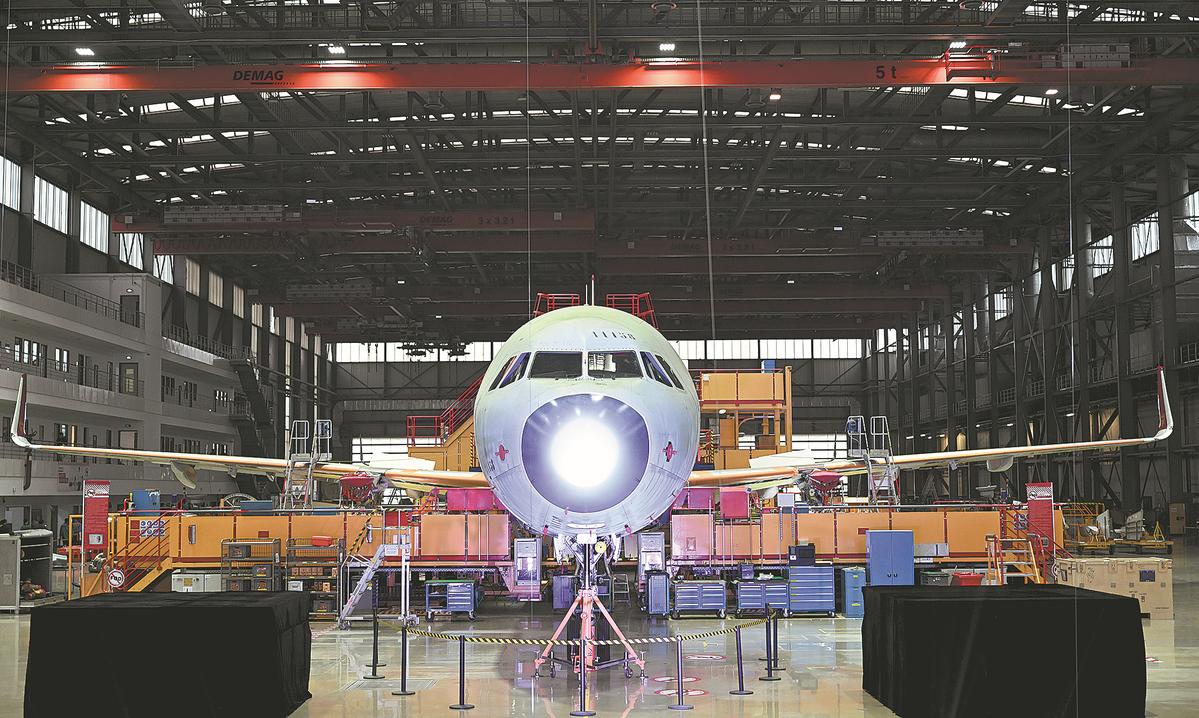Airbus seeks more ties in China market
 0 Comment(s)
0 Comment(s) Print
Print E-mail China Daily, September 8, 2023
E-mail China Daily, September 8, 2023

An aircraft is being assembled at the Airbus final assembly facility in Tianjin. [Photo/Xinhua]
European aircraft manufacturer Airbus said it would continue to increase investment in China, its largest single-country market, and expand its supply chain in the country by cooperating with more Chinese suppliers, including startups, driven by China's strong demand for new aircraft and rapid recovery of the air travel market.
This year marks the 15th anniversary of the inauguration of Airbus' final assembly facility in Tianjin. Opened in 2008, the facility serves as the first Airbus commercial aircraft assembly line outside of Europe.
Airbus plans to further expand its A320 fleet's final assembly capacity in Tianjin with a second line currently under construction. The new facility is expected to be put into operation and begin delivery by the end of 2025, and Airbus is highly confident it will complete it on time.
Alberto Gutierrez, chief operating officer of Airbus, said during his first visit to China this week in Tianjin that he was impressed with the country's development and infrastructure and Airbus will continue to invest in China.
"As a foreign company, we have been developing in China for decades. We are extremely confident in China. Our growth and investment in China speak for themselves," Gutierrez said.
Meanwhile, George Xu, Airbus executive vice-president and Airbus China CEO, added that China's economic growth relies on globalization and connectivity. China aims to achieve high-quality development by focusing on innovation and decarbonization, and Airbus can play a crucial role in supporting such a trend, he said.
Currently, Airbus operates four A320 final assembly sites worldwide, located in Hamburg, Germany; Toulouse, France; Mobile, Alabama, the United States; and Tianjin, China.
The company said it tailors the management and operations of its final assembly lines in different regions to local conditions. Tianjin embodies a practical culture and the Tianjin line boasts significant competitiveness and growth opportunities.
Airbus manages more than 13,000 suppliers globally. In the post-COVID era, it aims to gradually increase production capacity and better maintain the stability of its supply chain. The company also plans to directly manage more second- and third-tier suppliers in addition to first-tier.
In China, Airbus has some 200 suppliers. Chinese suppliers have been doing well in terms of competitiveness and safety, it said. In 2020, the total value of Airbus' supply chain in China reached $1 billion.
Airbus said it is considering the potential to extend cooperation with more Chinese startups as its suppliers, and it would like to recommend those Chinese companies to its research center in Suzhou Industrial Park in Jiangsu province.
Passenger demand for international travel continues to grow globally. In June, total air traffic numbers globally resumed to 94.2 percent of the level seen in June 2019, according to the International Air Transport Association, which is comprised of over 300 airlines.
In the first six months, China's civil aviation transport maintained its recovery and growth momentum, almost reaching the level seen in 2019 before the pandemic, according to the Civil Aviation Administration of China.
In the meantime, the second C919, China's first self-developed narrow-body aircraft, was put into commercial operation by China Eastern Airlines in August, serving travelers between Shanghai and Chengdu, Sichuan province.






Go to Forum >>0 Comment(s)